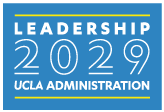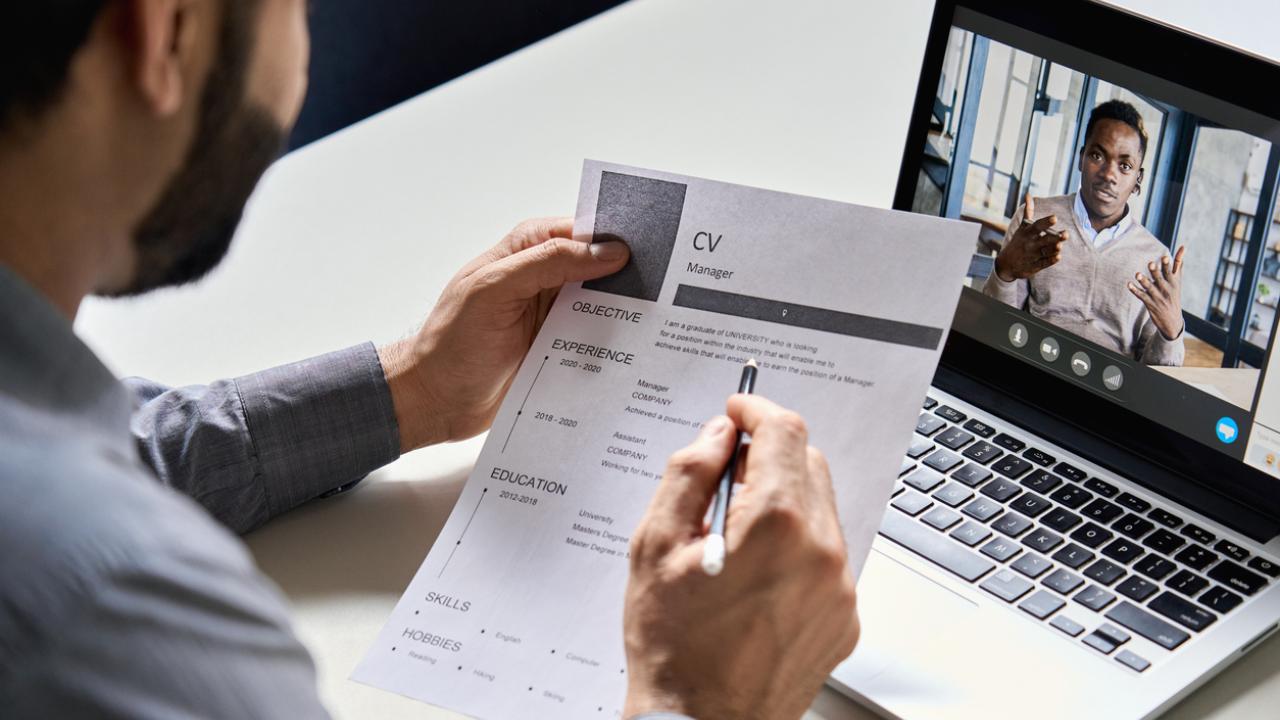This article was written through a collaboration between numerous UCLA departmental representatives & the MMT team.
Management Topic: Virtual Recruitment
Dear Colleagues,
As departments move forward with recruitments and hiring managers and interviewers remain remote or in hybrid workplace arrangements, management will need to be flexible and creative with their interviewing arrangements. In addition, one of the benefits of having FlexWork arrangements is it opens the candidate pool to those outside of Los Angeles for those applying to fully remote roles. This month, we will be providing hiring managers with the tools, resources, and best practices to ensure an efficient, positive and equitable recruitment process. Further, we have included recommendations for incorporating best practices to ensure your recruitment process aligns with our mission and dedication to hiring a diverse workforce.
Special thanks go to our colleagues in Campus Human Resources Talent Acquisition & Workforce Planning and Administration’s Equity Council Advisors for their contributions to this month’s Monthly Management Tips (MMT).
Preparing for Recruitment & Creating a Recruitment Plan
- One major key to a successful recruitment, virtually or in-person, is to treat your recruitment like you would a departmental initiative or goal and build a timeline. Recruitment Timelines will help you create a realistic Time-to-Hire Goal and ensure you cover each important phase of the recruitment.
- A well-planned recruitment from the time a requisition posting expires should take no more than 3–4 weeks to hire an applicant (up to 5 weeks is acceptable for example, if the selected candidate must give two weeks' notice). In the case of Multi-Hire Posting (MHP) requisitions, the time-to-hire might be longer than 3–4 weeks, depending on the number of positions being hired.
- Redact personal or private information from résumés (e.g. home address, phone number or even pictures) to mitigate bias for geography or proximity (i.e. you live too far away to get to work on time). For more information on managing implicit bias and available trainings, please visit the UC Managing Implicit Bias Series webpage.
- To successfully recruit, it is important to know what you are looking for in a successful candidate. Start by preparing a rating guide/candidate rubric so that you and all other interviewers will be able to objectively rate the applicants on how well their experiences and skills meet your needs.
- Once you have developed your rating guide/candidate rubric, develop job related interview questions. Interview questions should utilize inclusive language. Be sure to cover all the essential areas that the individual will need to perform if hired for the position. Additionally, develop behavior-based interview questions. Behavior-based interview questions will allow you to pin point on specific experience the candidates have demonstrated and if they have the behavioral traits you are seeking in a team member.
- Be consistent: it is generally advisable to establish five (5) to eight (8) questions that you will ask each applicant and remember, each applicant will have unique experiences so be sure to ask follow up questions based on their experience and job-related information they provided in their résumé.
- Ensure you have incorporated touch points into your recruitment process and maintain communication with the candidate.
- Set expectations early of what steps are included in the process and clearly communicate the anticipated timeline of each step in the process.
Virtual Interviews
UCLA recommends conducting a phone screening prior to inviting an applicant for an interview. Interviews take time to coordinate scheduling for all those participating and additional time and effort by all parties to sufficiently review the candidate’s information. Phone screenings allow you to establish continued interest in a job applicant that results in an appointment for an in-depth, in-person or virtual interview, or determines if an applicant’s qualifications do not sufficiently meet the job requirements. By the end of the phone screening, a hiring manager should know if a candidate:

- Is interested in the position. Confirm that the candidate has a passion for both UCLA and the role.
- The candidate should have a solid understanding of what the team, UCLA and department customers or clients are looking for.
- Is comfortable with the target salary range, work schedule, and work location. NOTE: UC policy and the law do not allow asking an applicant for their salary history. You should only state the target salary for the position as a way of checking if it fits with the applicant’s expectations.
- Understands and finds acceptable the transportation/parking options if the role is working on site or has a hybrid work arrangement.
- Is aware of and accepting of the anticipated start date.
- Can verify they have or can obtain required license or certification for the job.
- Accepts that employment is contingent on satisfactory results of a pre-employment background check, fingerprinting, and/or physical exam including drug test (that includes marijuana).
Interviews via Zoom can be just as engaging as in-person interviews. The following are best practices to ensure a positive experience for all parties:
- Be cognizant that although a candidate has agreed to an interview time, many candidates are in new and challenging personal situations (like those without childcare for young children). Demonstrate empathy and allow cameras to be optional if necessary.
- Limit the number of participants in the interview to ensure that candidates are not overwhelmed by a large number of panelists.
- Consider including fellow team members, stakeholders and clients in interviews who will bring a different and valuable perspective. Interview panels should include more than just the direct supervisor and reflect the diversity of the organization.
- If scheduling multiple back-to-back interviews, have one Zoom invitation and use the waiting room between sessions.
- Ensure all parties introduce themselves at the beginning of the interview just as they would in an in-person interview. Interview plans typically include: introductions, description of the position, questions for the interviewee, questions from the interviewee, closing statements and next steps, and time for the interviewers to debrief about the interview and document their notes. It is recommended introductions include preferred name, title, and pronouns. Names and pronouns can also be included in the Zoom information. This encourages the candidate to share theirs. Remember not to make assumptions.
- Provide details of your organization’s culture and environment and inquire whether these align with the candidate’s desired work environment.
- Minimize questions such as “Why should I hire you?” or “What appealed to you about this position?” Ask open-ended, behavior-based questions and focus more on questions that speak to individual motivators. Review the in-progress UCLA Questions Database.
- For those interviewing for leadership positions, ask candidates Diversity Questions that will expose their commitment to diversity and an inclusive work environment.
- Share contact information via the chat before ending the session and allow time at the end of the interview for the applicant to ask questions and gather the provided contact information.
- Candidates are interested in knowing more about Equity Diversity & Inclusion (EDI) at UCLA and its role in your department and process. Conduct research to familiarize yourself with the plethora of efforts on campus and prepare talking points prior to the interview in anticipation of these questions. Your department’s equity advisor can also assist and engage in your search process.
- Share the department’s FlexWork arrangements.
Common Interview Mistakes
- Not letting the candidate speak or interrupting the candidate. Ask questions and guide the conversation, but the candidate should be doing most of the talking.
- Allowing the candidate to stay in an active-listening mode.
- Shy candidates might stay quiet during the interview. It is important to ask questions that get them involved in the conversation.
- A candidate who chooses not to engage in the conversation needs to be nudged. Ask open-ended questions like "What do you think of that?" or "Does that sound like something you'd be passionate about?" If the candidate answers with "yes," then ask why they would. Doing this can ensure the job applicant is passionate about the position.
Follow Up & the Candidate Experience
Follow up with candidates after the interview regarding next steps in the process or to inform them they will not be moving forward. Do your best to leave the candidate with a good impression. Just because they were not the best fit for your position does not mean they are not a future applicant and the best candidate for another position at UCLA.
Next Steps
- Utilize SkillSurvey for reference checks. SkillSurvey provides electronic reference checking services for campus staff recruitments. SkillSurvey’s automated reference checking solution allows recruiters and hiring managers to reach more references faster and obtain meaningful, predictive insights on a candidate’s past performance. Contact your Talent Acquisition Consultant to assist you with this process.
- It is highly recommended that you review the personnel file for your final candidate if they are a UC employee. Employees should be provided a courtesy notice that their personnel file will be reviewed as part of the recruitment process.
Helpful Tools to Learn More About This Topic:
- Top Tips for Virtual Recruiting and Onboarding (3 minutes 17 seconds)
For more recommendations, please contact your employment consultant or department’s equity advisor!
Interested in reviewing prior months’ topics? Visit our Monthly Management Tips website.
Stay Safe!

Do you have feedback, questions or a suggested topic you would like to learn more about? Please email: managementtips@ucla.edu.
Want to receive Monthly Management Tips emails? Sign up for our list!

